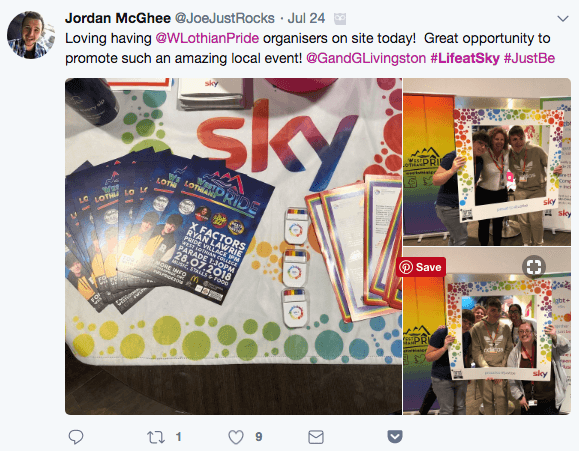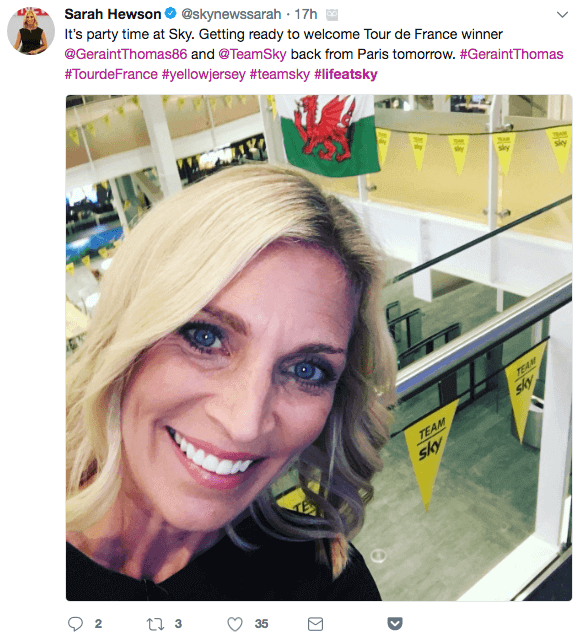Organizations that take the opportunity to be more inclusive are winning. Companies in the top quartile for gender diversity on their executive team are 21 percent more likely to experience above-average profitability than companies in the fourth quartile. For ethnic/cultural diversity, this likelihood of outperformance rises to 33%.
Diversity in the workplace can increasingly be powered from within by an organization’s most valuable attribute, its own people. Here are five crucial factors employers should consider when looking at how employee advocacy helps drive recruitment diversity.
Increase Your Reach
HR directors have an opportunity to develop a talent acquisition strategy with a significantly increased reach by working with employee brand advocates. Employees have on average 10 times more connections than brand channels, and brand messages are shared 24 times more when distributed by employees, versus the same messages shared via official brand social channels.
Sky’s #LifeatSky employee advocacy programme has united colleagues from across the company in celebrating its culture, experiences and activities. It has resulted in an improved recruitment process, driving 100 hires and 10,000 applications through harnessing its people on social media. Meanwhile, Unilever’s employee advocacy programme means colleagues are sharing 14x more frequently, there are 5x more job views and 4x more engagement with content.
Whether it is attracting more women to senior positions, building better employer branding awareness for millennial candidates, developing a culture more welcoming or more inclusive, employees can reach more people. Adopting a tech-enabled employee advocacy program allows colleagues across the business to engage with the vision, values and purpose of the brand.
Scale Up Quickly
Advances in HR tech means brands are able to manage employee advocacy programs easily, scale the number of employees involved rapidly and measure the results accurately. That means creative content marketing can be put into the hands of staff, tracked in real-time and recruitment success reported to senior leadership.
Scaling up like this means a diversity of individual voices from across the organization can be celebrated and heard, opening up new recruitment streams across a multitude of demographics for sustainable results. Plus, when employees share content they achieve a click-through rate twice that seen by their company.
Build Trust
Candidates are 40 percent more likely to apply for a job at a company when they recognize the brand. Employees are significantly more trusted than CEOs, according to the Edelman Trust Barometer, and employees are able to reach the wider candidate base needed to build familiarity.
Potential candidates will now expect to see recommendations and reviews from their personal network of friends, family and peers to help them make informed decisions on new roles. Word-of-mouth marketing is the best form of advertising — 84 percent of consumers trust recommendations from friends and family.
Employee advocacy programs allow colleagues to share local and relevant content to their personal networks to maximize the variety of candidates and reach a huge passive candidate pool. When Iceland Foods launched its Qubist employee advocacy app, Iceland Insiders, it generated more than 37 million impressions in the first three months alone, through employees’ own social channels, raising brand awareness and supporting the company’s marketing initiatives. Through the app, Iceland staff can share brand content to their own personal social media channels. The goal was to raise brand awareness of Iceland Foods and support talent acquisition.
Access New Talent Pools
To reach new talent pools and recruit different types of talent, employee brand advocates can help amplify existing employee networks. Sky, which has gained recognition as an inclusive employer, has an employee network that includes groups like Parents, LGBT and Women. Employees company-wide share content from the network on their own personal social channels. It also amplifies events such as International Women’s Day or Pride through its employee advocates.


To recruit hard-to-reach demographics, developing an inclusive culture and celebrating diversity internally is increasingly a workplace trend. 78 percent of employers surveyed for LinkedIn’s Global Recruiting Trends 2018 said improving diversity “to improve company culture was a focus.
Go Social
When 79 percent of candidates use social media in their job search, it’s important to make it easy for them to engage with you via employee advocates. This is especially important at a time when traditional recruitment techniques are ineffective as people turn on ad blockers, and social channels such as Facebook prioritize friends and family over brand content. In an era of transparency and “fake news,” employees are seen as authentic and have real influence — the ability to cause effect or change behaviour — compared to brands.
With a mobile-first, multi-language employee advocacy app, large companies can bring together a disparate workforce to share relevant and personalised content on their own social channels. This kind of tech-enabled employee advocacy platform means colleagues feel empowered and passionate about their role in driving their company forward, while driving awareness of the Employer Brand Proposition (EVP) to a new and diverse audience.
Post Views: 1,996